/topics/society-culture-religion-and-history
Society, Culture, Religion and History
ICRC is looking for Water and Habitat Program Coordinator at New Delhi - Apply by 19th June 2011
Posted on 24 May, 2011 11:24 AMContent Courtesy: DevNetJobsIndia
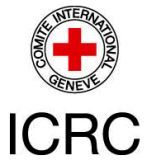 The International Committee of the Red Cross (ICRC) is an independent, neutral organization ensuring humanitarian protection and assistance for victims of war and other situations of violence. The ICRC is at the origin of both the International Red Cross / Red Crescent Movement and of international humanitarian law, notably the Geneva Conventions.
The International Committee of the Red Cross (ICRC) is an independent, neutral organization ensuring humanitarian protection and assistance for victims of war and other situations of violence. The ICRC is at the origin of both the International Red Cross / Red Crescent Movement and of international humanitarian law, notably the Geneva Conventions.
Planning for vulnerability - The hazards and setbacks in coastal legislation – A report by Dakshin Foundation
Posted on 22 May, 2011 06:16 PM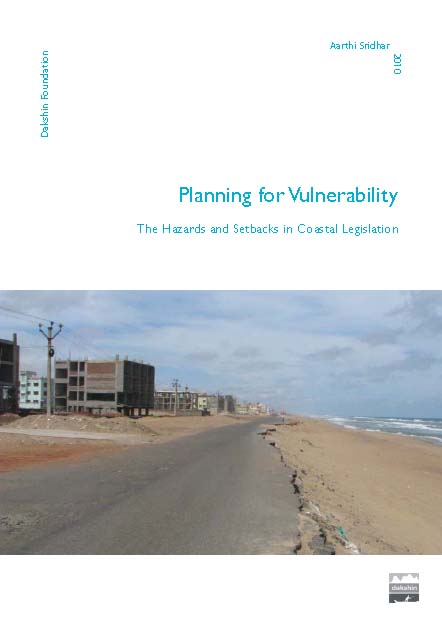 The law pertaining to coastal spaces – the Coastal Regulation Zone (CRZ) Notification, 1991 specifically decides what people can and cannot do on the coastal stretches of the country.
The law pertaining to coastal spaces – the Coastal Regulation Zone (CRZ) Notification, 1991 specifically decides what people can and cannot do on the coastal stretches of the country.
Harbouring trouble - The social and environmental upshot of port growth in India – A report by Dakshin Foundation
Posted on 22 May, 2011 12:04 PMBesides its own impact, port development is often accompanied by other activities such as the location of industries, power plants, railway lines, highways, hotels, SEZs, residential complexes, etc., that have multiple detrimental impacts – environmental, social and erosion related.
Claims for survival - Coastal land rights of fishing communities – A report by Dakshin Foundation
Posted on 22 May, 2011 09:25 AM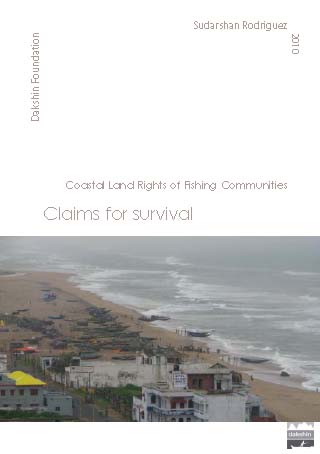 Marine-coastal ecosystems and coastal communities are poorly represented in the public debates on India’s social and environmental problems. Coastal and marine ecosystems are the backbone of a fisheries economy that supports livelihoods of millions directly and several more indirectly.
Marine-coastal ecosystems and coastal communities are poorly represented in the public debates on India’s social and environmental problems. Coastal and marine ecosystems are the backbone of a fisheries economy that supports livelihoods of millions directly and several more indirectly.
Community groups such as fishers and other coastal populations enjoyed customary or traditional rights to exploit resources and to fish in adjacent coastal areas. The current state of fisheries finds its genesis in the modernization programme introduced by the Government of India to ‘develop’ the sector with the focus for development through the maximisation of production. In the late 1970s, modern fishing methods threatened the livelihoods of these communities and coastal ecosystems. Mechanised craft and gear, principally trawlers with bottom trawling gear, severely impacted fishing stocks.
Fisherfolk in India have struggled for greater control over the seas and resource management, struggles which have been directed both inward as well as against the State. The conflict over the coastal space is mostly between fishing communities and other new users and interest groups. Access to coastal resources is now being thrown open to all, giving a new meaning to the idea of ‘coastal commons’. There are very clear linkages between the rights to the coast and the right to fish as without the former, the latter will be difficult to operationalise and eventually rendered meaningless.
The Coastal Regulation Zone (CRZ) Notification, 1991 has been the only legislation with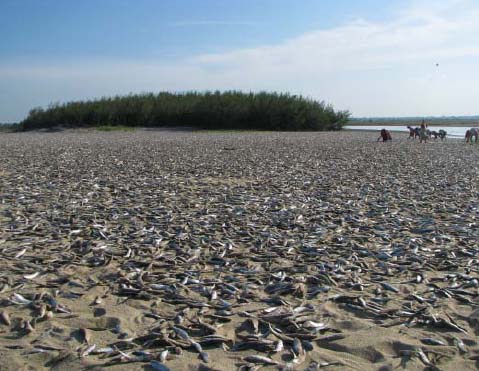 some mention and reference to customary rights of fishing communities on land in the coastal zone. However, it did not contain provisions and details to ascertain or establish these rights. Despite this, fishing communities have seen the CRZ in its 1991 form as an instrument in their favour as it regulates all activities that can potentially impact the coast and community livelihoods. However, the twenty one odd amendments to the CRZ Notification were mostly in favour of development pressures and special interest lobbies.
some mention and reference to customary rights of fishing communities on land in the coastal zone. However, it did not contain provisions and details to ascertain or establish these rights. Despite this, fishing communities have seen the CRZ in its 1991 form as an instrument in their favour as it regulates all activities that can potentially impact the coast and community livelihoods. However, the twenty one odd amendments to the CRZ Notification were mostly in favour of development pressures and special interest lobbies.
This backdrop forms the driving force behind this report which seeks to argue a case for according coastal land rights to fishing communities.
Monitoring system for incentive programs – Learning from large-scale rural sanitation initiatives in India – A report by the Water and Sanitation Programme
Posted on 21 May, 2011 02:15 PM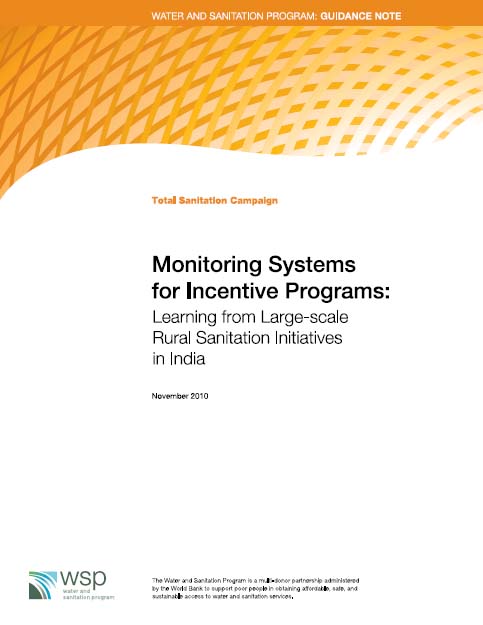 It is a part of the Global Scaling Up Rural Sanitation project of the Water and Sanitation Programme, World Bank and focuses on learning how to combine the approaches of Community Led Total Sanitation (CLTS), behavior change communications, and social marketing of sanitation to generate sanitation demand and strengthen the supply of sanitation products and services at scale, leading to improved health for people in rural areas. This is one in a series of knowledge products designed to showcase project findings, assessments and lessons learned in the project.
It is a part of the Global Scaling Up Rural Sanitation project of the Water and Sanitation Programme, World Bank and focuses on learning how to combine the approaches of Community Led Total Sanitation (CLTS), behavior change communications, and social marketing of sanitation to generate sanitation demand and strengthen the supply of sanitation products and services at scale, leading to improved health for people in rural areas. This is one in a series of knowledge products designed to showcase project findings, assessments and lessons learned in the project.
Over the last few years, the concept of open-defecation free communities has emerged as one of the building blocks toward achieving total sanitation. The term ‘access’ is widely used to capture increase in sanitation usage. However, a clean environment is a public good. Hence, there was a need to achieve total sanitation at the community level to realize public health benefits. This has led policy makers and practitioners to adopt strategies that achieve community-wide total sanitation status, which includes the community becoming open-defecation free, and adopting safe hygiene and environmental sanitation practices.
The rape of Goa - A photo documentary by Rajan Parrikar (2008)
Posted on 17 May, 2011 05:41 PMGoa, the last remaining redoubt of the pleasant, civilized life in India, now faces environmental ruin from indiscriminate construction and exploitation of its natural resources. Concomitant with this ruin is the imminent erasure of its sui generis identity and culture wrought by the uncontrolled influx of migrants from all over India. First released in May 2008, this documentary was screened in towns and cities all across Goa.
Groundwater scenario in major cities of India – A report by Central Ground Water Board
Posted on 17 May, 2011 10:35 AM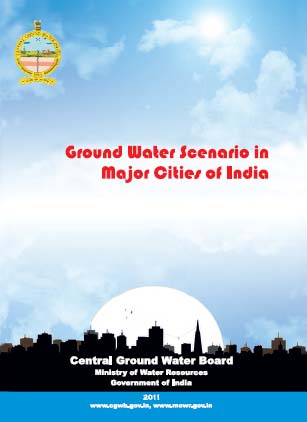 It covers varying groundwater scenarios in the country including the highly developed metros, the hilly region, the coastal cities, the cities tapping unconsolidated and hard rock aquifers. The report briefly describes the administrative set up, status of water supply and demand, groundwater scenario, feasibility of rainwater harvesting and groundwater development strategy.
It covers varying groundwater scenarios in the country including the highly developed metros, the hilly region, the coastal cities, the cities tapping unconsolidated and hard rock aquifers. The report briefly describes the administrative set up, status of water supply and demand, groundwater scenario, feasibility of rainwater harvesting and groundwater development strategy.
It is an updated version of an earlier report on “Groundwater in urban environment in India” (2000). Since then, groundwater regime, urban demography and water demand have changed enormously. This report will form a scientific base for an in-depth understanding of urban groundwater system including aquifer geometry, water level behavior and groundwater quality. The possibility of artificial recharge to rejuvenate the urban aquifers has also been discussed.
Jalyatra: Exploring India's traditional water management systems
Posted on 14 May, 2011 07:34 PM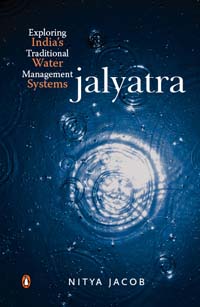 Jalyatra - Exploring India's traditional water management systems, by Nitya Jacob is an ecological travelogue that looks at links between water, society and places It describes in detail what existed, how it fitted into the socio-cultural milieu and was appropriate for the local climate and geography. It then examines reasons for their decline, as indeed most have, in recent decades.
Jalyatra - Exploring India's traditional water management systems, by Nitya Jacob is an ecological travelogue that looks at links between water, society and places It describes in detail what existed, how it fitted into the socio-cultural milieu and was appropriate for the local climate and geography. It then examines reasons for their decline, as indeed most have, in recent decades.
While recording the dismal state of traditional systems, the author stumbles upon small initiatives that have brought about significant transformation across regions. It refers to noisy hidrums and gharaats, the river-run flour mills of Uttaranchal, the technologies whose potential has yet to be fully realised. It looks at water harvesting structures of southern India—the eris and ooranis. However, it admits that the average person is singularly uninterested in protecting the environment.
Jalyatra captures the efforts of NGOs and enlightened individuals striving to revive these systems. It makes the case for a mass movement to revive traditional water management systems, especially village ponds, across the country as the way to ensure water security in India. In Chambal, the author meets Brij Mohan Gujjar, dacoit turned water conservationist, who is doing valuable work on the check dams designed to control the flow of water in the ravines; and in Shillong, Lan Potham shows him the uses of the easily available bamboo to construct the shyngiar which irrigates his areca nut plantation.
NREGA and rural water management in India: Improving the welfare effects – An occasional paper by IRAP
Posted on 09 May, 2011 09:41 PMNREGA is being eulogized by many in the academic, development and policy arena as a “silver bullet” for eradicating rural poverty and unemployment, by way of generating demand for productive labour force in villages and private incentives for management of common property resources.





